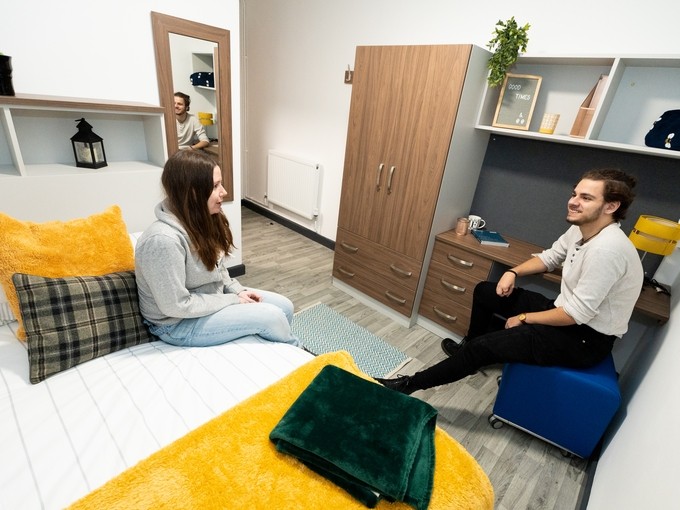Our degree programme in Archaeology will provide you with amazing opportunities in the field and beyond. Not only will you be taught by experts at the cutting edge of field research, but you will also engage in practical archaeological investigations. All archaeology students can gain experience in laboratory techniques as part of their degree.
Archaeology is the study of the human past through an examination of physical remains, such as stone tools, pottery and bones, through to buildings, structures, monuments and landscapes. It attempts to reveal how both contemporary societies and past societies are organised, how humanity interacts with the environments and landscapes, and how ideas about the world are visible in the objects people have created.
To be able to understand the past in any depth, engagement with theoretical and ethical issues is needed. This means we explore issues such as heritage, representation, land use, technology, environmental change, death, beliefs and the evolution of the human body, mind and ideas with a view to broadening and widening knowledge of how humanity has arrived at the position it is in now.
Course details
- On-campus
- Full-time
- English
Tuition Fees 2023/24 and 24/25
Home (Full-time): £9,000 per year
Overseas (Full-time): £13,500 per year
Why choose this course?
What you will learn
Archaeology is the study of the human past through an examination of physical remains such as stone tools, pottery and bones, through to buildings, structures, monuments and landscapes. It attempts to reveal how both contemporary societies and past societies are organised, how humanity interacts with the environments and landscapes, and how ideas about the world are visible in the objects people have created.
To be able to understand the past in any depth, engagement with theoretical and ethical issues is needed. This means we explore issues such as heritage, representation, land use, technology, environmental change, death, conflict, beliefs and the evolution of the human body, mind and ideas to broaden and widen knowledge of how humanity has arrived at the position it is in now.
Several modules include a field trip to historic sites and landscapes.
Prospective students should be aware of the following:
- Not all optional modules are offered every year
- Optional modules are delivered subject to sufficient student numbers
- Language modules are optional/compulsory/core according to linguistic ability
- There are many Level 5 and Level 6 versions of the same module. Students can only take this module once; this depends on which year the modules are offered in.
Compulsory
Optional
(20 credits)
(20 credits)
(20 credits)
(20 credits)
(20 credits)
Year A
(20 credits)
(20 credits)
(20 credits)
(20 credits)
(20 credits)
(20 credits)
(20 credits)
(20 credits)
Year B
(20 credits)
(20 credits)
(20 credits)
(20 credits)
(20 credits)
(20 credits)
(20 credits)
Year A
(40 credits)
(20 credits)
(20 credits)
(20 credits)
(20 credits)
(20 credits)
(20 credits)
(20 credits)
Year B
(20 credits)
(20 credits)
(20 credits)
Course Page Disclaimer
-
We listen to student feedback and insights from industry and from professionals to ensure that course content is high-quality and up-to-date, and that it offers the best possible preparation for your future career or study goals.
For this reason, there might be modifications to the content of your course over time, to keep up to date with changes in the subject area or in the sector. If a module is no longer running, we’ll make sure to keep you informed, and work with you to choose a different suitable module.
testimonial
Accommodation

Lampeter Accommodation
Our Lampeter accommodation is based on our Lampeter Campus, meaning you are never far from what is happening on campus. We have a variety of different options open to our students which will suit all budgets.
Further information
-
Grades are important; however, our offers are not solely based on academic results. We are interested in creative people that demonstrate a strong commitment to their chosen subject area, and therefore we welcome applications from individuals from a wide range of backgrounds.
To assess student suitability for their chosen course, we normally arrange interviews for all applicants at which your skills, achievements and life experience will be considered as well as your qualifications.
-
The programme is assessed in a variety of ways. It will include several of the following type of assessment: essays of 1,000 to 4,000 words in length, document analysis, book/ journal reviews, short reports and reflective journals, time tests, field journals, posters, group and individual presentations.
-
The Faculty has estimated on the assumption that students buy new copies of the books. Students may also choose to spend money on printing drafts of work.
Students may spend up to £300 per year on books and additional related materials.
Students are expected to submit 2 hard copies of their final project, the estimated cost for binding these is £20.
Optional Field trip:
The faculty works to ensure that there is a range of fieldwork and field trip options available both locally and internationally. Thus students can opt to take either more expensive or less expensive placements. The Faculty subsidises these but the cost each year is dependent on airfare, location, and currency exchange rates. Below are the upper end of expected costs based on where students have currently done placements.
Fieldwork (depending on where the student decides to do fieldwork): c. £500 - £1,500
Individual trips: c. £5 - £50 -
You may be eligible for funding to help support your study. To find out about scholarships, bursaries and other funding opportunities that are available, please visit our Bursaries and Scholarships section.
-
Career and employment opportunities include:
- Government and commercial management
- Heritage sector
- ITC
- Local community and council work
- Museum, exhibition and archive work
- Professional field archaeology
- Research and Postgraduate opportunities
- Teaching, education officer
- Voluntary work
